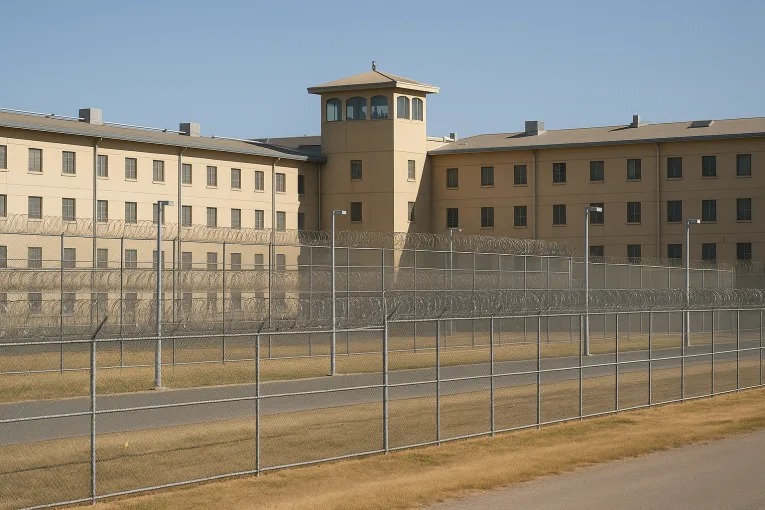
WASHINGTON, DC – A report released Tuesday by FWD.us, an organization focused on criminal justice reform, finds that mass incarceration in the United States is driving families into poverty and limiting economic mobility, NPR reports.
According to the report, incarceration costs families $348 billion annually in lost wages and out-of-pocket expenses. That figure is roughly four times what the federal government spends each year to operate prisons and jails.
Nearly half of all Americans have had an immediate family member incarcerated, NPR notes. Black Americans are more likely than white or Hispanic Americans to experience this, according to the report.
Dorothy Gaines, a mother of three who spent seven years in federal prison, knows firsthand the toll incarceration takes on families.
“My oldest daughter was 18. She had to come out of college and try to take care of them,” Gaines said. “So it was a lot of stress on her, as well as a lot of stress with me worried about them.”
Now 67, Gaines has been out of prison for 25 years. She said her children continue to feel the long-term effects of her incarceration. Her son, who was 9 years old when she went to prison, is currently serving a 10-year sentence of his own.
Despite facing financial hardship—including the risk of losing her housing by the end of the summer—Gaines tries to support her son.
“I’ll go without sometimes, so I can make sure I can accept a phone call from him,” she said. “I try and put some type of money on his book so he can have soup or something he can eat. I know what it’s like to go to bed hungry.”
According to the report, families with an incarcerated loved one spend an average of $4,195 annually on communication and caregiving. For someone living at the federal poverty line, that represents about 27 percent of their income. Expenses include travel, phone and email charges, and deposits to commissary accounts.
“That’s a lot of money for anybody,” said Zoë Towns, executive director at FWD.us. “It’s important to understand that it’s actually falling on the families that can least afford it.”
FWD.us partnered with researchers at Duke University and the University of Chicago to survey more than 1,600 people to quantify the costs of having a loved one in jail or prison.
The report found that incarceration also reduces household income, since incarcerated individuals can no longer contribute financially. Family members often take on caregiving roles and stay home with children, further lowering earnings. These financial impacts continue even after a loved one is released.
“These previously undocumented financial impacts include $111 billion in lost earnings experienced each year by those who were incarcerated,” the report stated, “and more than $215 billion in lost earnings that children of incarcerated parents experience from having their lives upended and the stability of their families undermined during the critical years of bonding, development, and education.”
The findings align with earlier research. A 2015 report by the Ella Baker Center for Human Rights found that nearly two-thirds of families with an incarcerated member struggled to meet basic needs such as housing and food. These hardships are often compounded by limited access to public assistance, reduced credit opportunities, and wage penalties associated with criminal records.
Felicity Rose, vice president of criminal justice policy and research at FWD.us, said the report aims to link the nation’s affordability crisis with the hidden costs of incarceration.
“We thought it was really important to help bring those issues together so people can see how they’re related,” Rose told NPR. “Because they are related.”
The study also acknowledges limitations. Many participants estimated their financial losses, and similar studies have reported a wide range of figures. In 2017, the Prison Policy Initiative estimated that incarceration—when including prisons, jails, policing, and family support—costs the U.S. roughly $182 billion per year.
Still, experts say efforts to measure the cost of incarceration are important. “The value of that number is that it’s a way to say that this matters,” said Peter Wagner, executive director of the Prison Policy Initiative. “What you end up with is a very expensive, inefficient way to make poor people have a harder time to succeed.”
The toll is not just financial, but emotional and generational. Lex Steppling, a community organizer in Los Angeles, told NPR that having both his father and stepfather incarcerated led him to drop out of high school to help support his family. But it was his younger brother, he said, who suffered most.
“My brother’s dad was very handy. He was a mechanic, he was a carpenter. My brother really had an aptitude for that,” Steppling said. “So he gets taken out of the picture, and then my brother doesn’t have that person anymore.”
As Steppling’s story illustrates, the impact of incarceration can ripple for decades. “It’s very painful to have people in your family just snatched up out of your life and thrown into a fortress,” he said. “What it does to people’s work prospects and the generational strain it puts on families is immeasurable.”
Categories:
Breaking News Everyday Injustice
Tags:
Dorothy Gaines Ella Baker Center for Human Rights Lex Steppling Mass Incarceration Princeton Policy Initiative Prison Costs
This post was originally published on this site be sure to check out more of their content.








